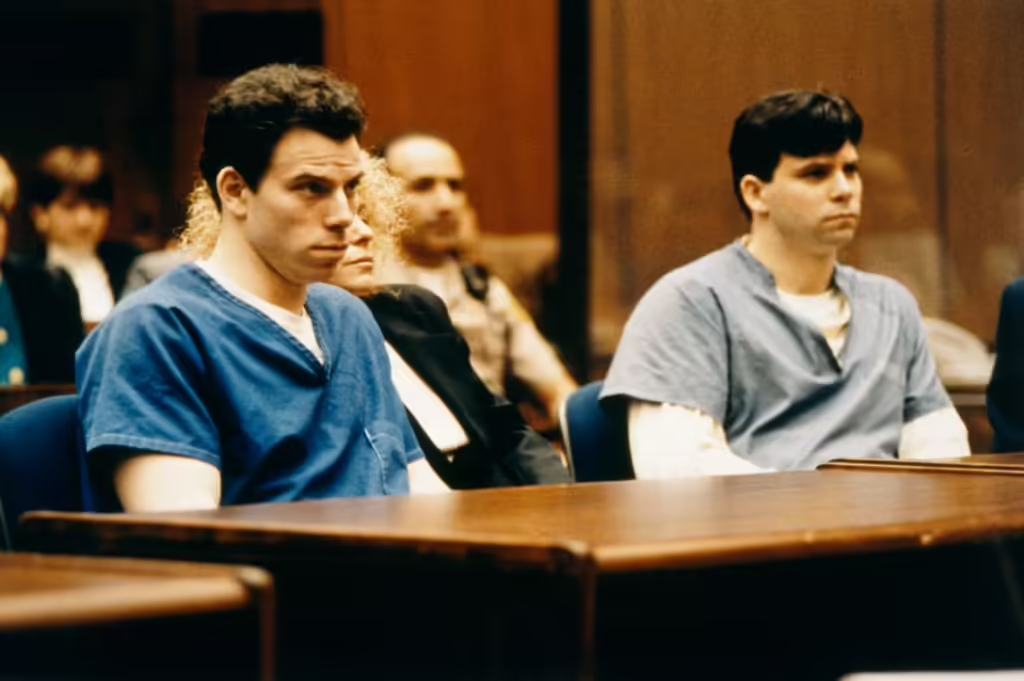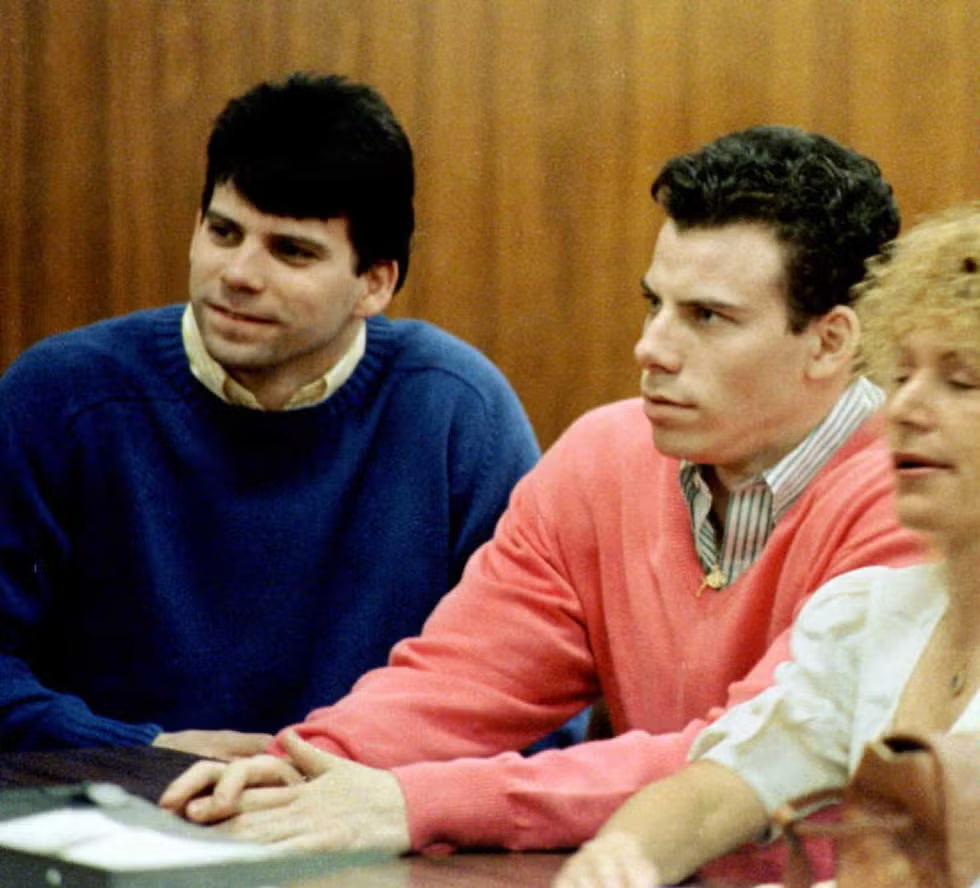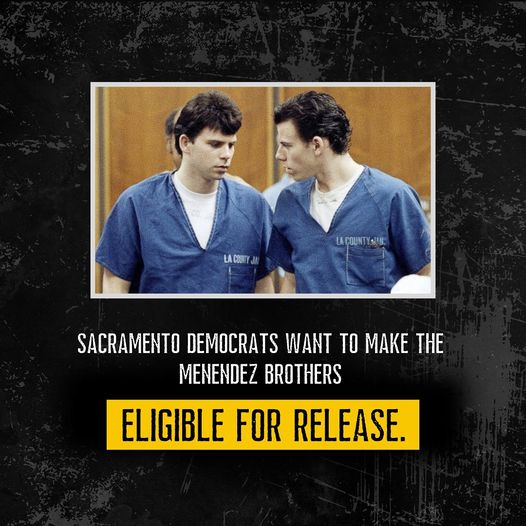Lyle and Erik Menendez cited emotional and sexual abuse, among other reasons, for the gruesome 1989 murders of their father and mother.

On August 20, 1989, José and Mary Louise “Kitty” Menendez were shot to death in their Beverly Hills home. Nearly seven years, three trials, and many thousands of hours of TV coverage later, their sons, Lyle and Erik Menendez, were found guilty of their murders and sentenced to life in prison without the possibility of parole.
The Menendez murders became one of the most famous criminal cases of the late 20th century due to a potent mix of family drama, Hollywood connections, dramatic testimony, and cable TV’s ability to blanket the airwaves with coverage. As court proceedings unfolded, there was no doubt that Lyle and Erik had killed their parents. Why they did it was another story.
Monsters: The Lyle and Erik Menendez Story, a dramatized account of the murders, is now streaming on Netflix.
José and Kitty’s American Dream
The Menendez family seemed to be a perfect model of the American Dream, at least by 1980s standards. José was born in Cuba, emigrated to the United States as a teenager after the Cuban Revolution of the 1950s, and lived in the attic of a cousin’s home until he earned a college scholarship for swimming. In college, he met Mary Louise Anderson, a beauty pageant queen who everyone called Kitty and was a couple years old than him. They married in the early 1960s and moved to New York City, where José earned an accounting degree from Queens College. He then rose from washing dishes to working a successful young entertainment executive.
After leading the U.S. operations of car rental company Hertz, José spent the early ’80s as the head of RCA Records and had a hand in the signing of bands such as Duran Duran, The Eurythmics, and Menudo. With their sons Lyle and Erik, the Menendez family moved from Princeton, New Jersey, to Los Angeles just a few years before the murders so that José could take a job in the movie business. The house where José and Kitty were killed was located on one of the most exclusive blocks in Beverly Hills and was at different times occupied by Michael Jackson and Elton John.
The Menendez brothers also seemed to fit the platonic ideal of Reagan-era United States. Lyle was a star tennis player and seemed destined for a career in business like the father he openly worshipped. Erik turned out to be even better at tennis, helped along by his father’s obsessive intervention, and wound up as a nationally ranked player in his age bracket. In a sense, they had no choice but to be successful; José was known as a hard-driving father who would work his children to the bone in athletics and everything else.
“It seemed like José was so competitive, he was doing everything he could to try to make [Erik] better,” the brothers’ former swim team coach told the Los Angeles Times in 1990. “But he was so completely overbearing, it had the opposite effect. Erik had so much less self-confidence because everything he did was never good enough.”
After they moved to California, Erik took teenage rebellion to an extreme and took part in a string of burglaries in 1988. He avoided jail time but attended court-ordered therapy with Dr. Jerome Oziel. Lyle enrolled in Princeton University but was suspended for a year for plagiarism, portending trouble in the years to come.

A Gruesome Crime Scene
The Menendez murders were brutal; 45-year-old José and 47-year-old Kitty were not so much killed as rendered nearly unidentifiable by 15 rounds from two 12-gauge shotguns. It was so barbaric that police thought the killings were a mob hit, and early investigations focused on business rivals and a porn executive who had a bone to pick with José.
The night of the murders, the brothers told police they’d gone out that night to see a movie but had to make a pitstop to retrieve Erik’s ID. That’s when they discovered their parents’ decimated bodies and dialed 911, they said in their interviews. The officers who responded to the 911 call found Erik, then 18, sobbing on the lawn before entering the crime scene.
In the months that followed the slayings, neither Menendez brother acted like young men who had recently found both of their parents dead in a brutal, bloody murder scene. Instead, they acted like two guys who had just won the lottery. José was worth $14 million at the time of his death, and within six months, the brothers spent an estimated $700,000 of his fortune.
Lyle, who was 21 at the time of the murders, purchased a Rolex, a Porsche, lots of clothing, and a restaurant back in Princeton, where he had been living before the murders. Erik was more practical, opting for a Jeep Wrangler, a $50,000 personal tennis coach, and a $40,000 investment in a rock concert that never happened. They took exotic vacations, too, thinking they had even more money coming to them. There was also a $5 million life insurance policy on their father, though technicalities stopped them from collecting.
The Brothers’ Taped Confession
After the murders, Dr. Oziel reached out to his former patient Erik and began counseling the younger Menendez brother once more. Soon enough, Erik confessed to killing his parents. Oziel confided in Judalon Smyth, with whom he was having an extramarital affair; she would ultimately play a big part in the case.
The therapy sessions continued, and Oziel ultimately got both Erik and Lyle on tape, confessing to the murders. Erik said they’d done it to put their mother “out of her misery,” while Lyle made it clear that they were both in on the crime.
Smyth and Oziel had a rocky relationship—she claimed he was controlling and abusive—and after he allegedly attacked her, Smyth contacted the Beverly Police to reveal that the Menendez brothers confessed to their parents’ murder. She even had an audiotape of the confessions.
Lyle was arrested on March 8, 1990. Erik, who was in Israel at the time for a tennis tournament, flew to Miami and then Los Angeles, where he turned himself into police on March 11.
Figuring out whether the tapes with the confessions fell under doctor-patient privilege or were admissible as evidence in court took two full years, with lawsuits and appeals flying back and forth between the prosecution and the Menendezes’ lawyers. Finally, the Supreme Court of California ruled that two of the three tapes were eligible to be used in the trial, including one that contained Lyle’s admission of guilt.

